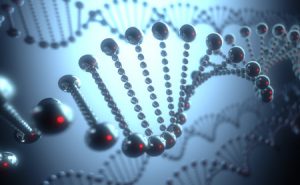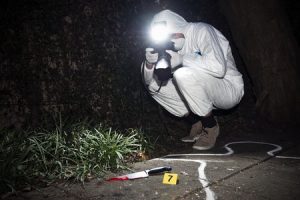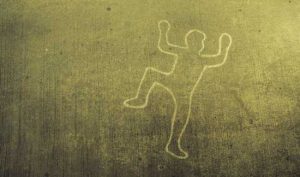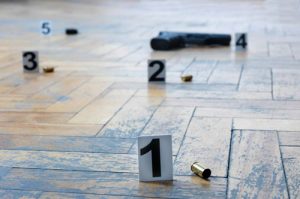The discovery of what DNA holds is celebrated every year on National DNA Day.
Due to be celebrated on 25th April 2017, it gave us the perfect excuse to look at how DNA has played a vital role in solving some of the worst crimes in Britain and how, decades after the crime has been committed, DNA technology is bringing perpetrators to justice.
Who Discovered DNA?
Deoxyribonucleic acid – or DNA as we know it – has been studied throughout the 20th Century but it was Rosalind Franklin and Maurice Wilkins who studied DNA using x-rays.
Franklin produced an x-ray that allowed two other scientists to work out the 3D structure of DNA, found to be a double helix.
In 1962, Crick, Watson and Wilkins received a Nobel Prize in Physiology or Medicine for their discovery. Rosalind Franklin had died four years previously with her role in the discovery not acknowledged until many years later.
DNA is used in many fields of study, one of which is in crime investigations. It is used in two ways: either to identify criminals with incredible accuracy where biological evidence exists at a crime scene such as hair, blood, skin etc. or to exonerate a suspect. You can learn more about this on criminology courses online, develop your skillset and knowledge.
DNA has played a vital role in many criminal cases, many of which are covered in the background of forensic science courses.
CASE 1: The Murder of Melanie Road
Advances in forensic science along with dogged detective work brought to justice the killer of Melanie Road.

DNA has played a vital role in solving some of the worst crimes in Britain
DNA analysis was not available at the time but police collected over 71 samples of blood, as well as several samples of semen.
Despite extensive enquiries, no killer was brought to justice. Until 2015.
The previous year, in 2014, a young woman was arrested because of a domestic violence altercation. As part of the arrest and charging process, a DNA sample was taken from her.
Melanie’s DNA was re-run in the system the following year and showed that some of the samples taken from the murder scene was a familial match with the woman previously arrested for the domestic violence incident. This led the police to Christopher Hampton, the father of the woman arrested and cautioned as part of the domestic violence charge.
Christopher Hampton voluntarily gave police a swab. His DNA profile matched the DNA of some of the blood posts and the semen found on or around Melanie’s body.
A few days before Christmas 2015, despite his not guilty plea and continual denials, Christopher Hampton was jailed for the murder of Melanie Road.
CASE 2: The Murder of Mary Klinsky
It is not just in Britain where DNA has played a crucial role in identifying and bringing to justice murderers and other criminals.
Mary Klinsky was described as a sweet 18-year-old but she was raped and killed with a blow to the head. Her body was discovered face down under a highway in the state of New Jersey.
There was significant evidence left at the crime scene, but in 1965, the ability to read and access this DNA information was simply not available.
In 2016, there was a breakthrough – DNA from the crime scene was matched to suspected serial killer, Robert Zarinsky.
But he was never charged. He had died in 2008 in prison, serving a sentence for the murder of a woman in 1969. Police also had evidence that he had murdered the previous year in 1968 and the information from the DNA samples strongly suggests that he was involved in, or carried out the murder of Mary Klinsky, too. How many more murders could he have been responsible for?
CASE 3: The Conviction of Colin Pitchfork
As part of Forensic Science courses, there is always more than a hint of caution, looking at cross-contamination in which results can be skewed, leading to false readings.
The rape and murder of Lynda Mann, and then another young woman in the same spot lead to Richard Buckland confessing to the crime.
A little-known DNA tool was used at the time – genetic fingerprinting – but no match was returned. The test was repeated twice but no trace of Buckland was found at the scene. He subsequently said that he has been pressured into the confession.

DNA is used in many fields of study, one of which is in crime investigations.
He sent a friend in his place to give fingerprints but couldn’t resist bragging about it. He was reported to the police.
Colin Pitchfork was the first murderer convicted using DNA evidence after his fingerprints proved a match to those found at the scene of both murders.
Advances in DNA Technology
Students of Forensic Science courses will be aware of the changes and advances that scientists are currently working on in relation to future DNA technology. And it promises to reveal even more mysteries.
It is an exciting field of study – why wouldn’t you want to be part of it?
Crime scene investigators, also known as CSIs, are an important cog in the process of solving crime. Sometimes, perpetrators are not caught at the time but, as science and our knowledge expands and develops, many people who committed crimes decades ago are now being brought to justice.
To be a CSI, you need to be methodical, with clear and logical thinking when faced with a crime scene. You need to know what to look for but you also need to understand that not all evidence and not all clues are left in obvious places to find. Some clues can make little sense too but, these small pieces come together to create a bigger picture.
For those affected by crime, the results are devastating. People can feel unsafe in their own homes but knowing that the authorities are doing everything they can, is a shred of comfort. For many people, this is the motivating factor at becoming qualified with online forensic science courses, knowing that they can and will make a difference.
You could be the CSI at a scene that finds the pieces of evidence that links everything together, effectively solving the crime.

To be a CSI, you need to be methodical, with clear and logical thinking when faced with a crime scene.
Studying from home – can it be done?
You would think that a forensic science officer would spend years honing their skills at university; some officers do but there are many scenes of crimes officers (SOCOs), CSIs, forensic photographers, ballistic experts and so on who honed their craft piece by piece, by studying various courses online and gaining experience in the field.
You too, could take this career path and work in a career that is fulfilling and exciting. But it is not for everyone. There are many crime scenes that are difficult to witness, with obvious signs of struggle and assault. There will also be some scenes in which the victim remains, and you will need to work in this high pressured and difficult environment.
But, with a comprehensive qualification underpinning your practice, you will have the skills and professionalism you need to process the crime scene, ensuring you note and bag all the evidence, take photographs of the scene and the various components within it – and do so correctly so that the investigation and any convictions are not compromised.
But can you study from home and still gain a forensic science qualifications online that are valuable and valued in the field. In fact, studying from home can bring many benefits;
- Self-discipline – to study at home and balance family, work and social commitments, shows a level of self-discipline that would be welcomed by any employer. You will need to make time to study, but you do this at a time that suits you. This may be an hour or two, three evenings a week, or you may study for an hour every evening, or maybe work on a day off through a module etc. You can research topics online, buy textbooks or download the online version to your Kindle, allowing you to read through a chapter as you wait for your bus to or from work; the
 opportunities to study present themselves in many different ways. By taking advantage of these, you are gaining valuable insight into your course.
opportunities to study present themselves in many different ways. By taking advantage of these, you are gaining valuable insight into your course. - Affordable – no need to give up work or drop hours. No need to apply for loans or grants. No need to get into debt. You can enrol right now, with a small deposit and then continue paying every month. Or you can pay in one lump sum but, the point is, online forensic courses can be far more affordable that a classroom-based course, without compromising on quality of materials or value of the qualification.
- Your pace – perhaps the most important aspect of learning from home is that you can study at a pace that suits you. Sometimes, you may grasp a concept or theory quickly, as you may already be familiar with it; if this is the case, you can move on. Or, there may be other concepts or ideas that you are unsure about and may choose to spend some time researching this topic further. The point is – you decide. You set the pace. This is YOUR course.
- Convenient – home study courses fit to your life, not the other way around. They are mouldable and malleable, making studying for a new qualification, new skills or advancing your current skill-set and knowledge to a higher level so much easier and we think, so much more fun too.
- Supported – every NCC Home Learning course comes fully supported by a tutor for 12 months which for most students, is ample opportunity to complete their course and to do so successfully. But life throws curve balls so when this happens, you simply opt for some more tutor support and still go on to complete your course successfully.
Apply today and start studying today too
With home study courses, you can start them at any time so there is no need to wait until the stat of the next academic year.
Enrol online today and take the first steps to an exciting new career using online courses with qualifications.
Has your imagination and interest been fired by watching real-life crime shows or even some of the more well-written police dramas? Have you wondered what it really takes to become a scene of crimes investigator?
Crime scene investigation is important because hidden, sometimes in plain sight, at a crime scene are clues, all pointing to what happened, why and by whom. Finding and processing this information accurately is part and parcel of an investigation, which is why forensic scientists are an important cog in the wheel of solving crime.
Working at scenes of burglaries to more gruesome situations, you too could be an important part of solving crime. And with several online forensic courses to choose from, you can start working towards a new career today.
Choosing the right qualification
When it comes to studying for a qualification, you need to choose the level that is appropriate to your current level of skill and knowledge. This doesn’t always mean starting at the bottom and working your way up, even if you are starting to study a new subject that s entirely new to you.

You too could be an important part of solving crime.
What you do need to check before enrolling on any course is that the qualification has value and merit within the field that you want to work in.
There are many courses offered online and they are described as levels. These levels start at entry level, up to level eight, which is the equivalent to a PhD. Level 3 Diplomas such as those offered with some forensic courses, are the equivalent to an A Level. Level 4 Diplomas are similar to the first year of a degree. As you go up the scale of levels, you will be expected to take increasing responsibility for directing and managing your study, as well as widen your reading and research skills.
Support for any student at any level is key to successful studying, so don’t assume that because you are struggling with a level three course that you are not capable of studying further up the scale. The skills you acquire at one level of study will be needed at higher levels thus once you acquire them, further study can actually be easier!
Benefits of home study
In the past, home study or online courses such as those within forensic science have not always enjoyed a good reputation. The elitism that once existed in education has now largely diminished, with as much value and credit being given to those students who choose to study online and at home. Education and learning can happen anywhere, whether you are reading a piece of text late at night at your desk, on the bus on the way home or in a classroom.
There are other benefits to learning online and at home too, such as;
- Convenience – you decide the best time to study and learn; you decide when you need a break or when you need to explore something in more depth. The convenience of being able to study when and how it suits you is second-to-none.
- Flexibility – online courses are not open ended. In most cases, online providers will suggest a timeframe in which to complete forensic science courses. Most level three courses suggest a 12-month timeframe. Within this time, you can study when and where you want.
- Individual attention and support – no matter what course you are studying or at what level, support is imperative. With online courses, you will find a level of individual support that you can call upon when you need some extra advice, hints and tips.
- Real skills and abilities – online forensic courses give you real skills that are valuable and valued in the field of forensic science. Being able to study under your own steam also shows a sense of self-discipline, as well as keen management and organisational skills. Don’t underestimate the true skill of being able to organise your household, work and study in your ‘spare time’ – and what this says to potential employers.
Applying for forensic science courses is simple
No one is going to tell you it is easy, working, running a home and studying as well as all the other things you have going on. You will falter and stutter, but you will also enjoy it, finding a whole new world, as well as skills and knowledge.
To start your journey to become a forensic scientist, take a look at what we offer. With many courses not requiring any prior learning or qualifications, you can enrol and start your journey TODAY! If forensic scientist doesn’t sound like your kind of thing, don’t panic – check out our wide range of online courses with qualifications.
Every time we move, breath, use or touch something, we leave behind a trace. It may be unseen to the naked eye but in a space that we have occupied, there will be evidence that we were there.
Knowing where to look and how to process a crime scene is part and parcel of what a forensic scientist does. When a crime is thought to have been committed, finding evidence is an important part of the process. The evidence that is found can form the cornerstone of a court case and so this is not something to be taken lightly.
People are convicted or acquitted based on the what the evidence tells us. It is a dynamic, fast-paced career, where no two days are the same. You can bear witness to crimes and events that are sad, difficult and unpleasant. You can make the difference to whether a crime is solved or not.
Forensic science – a wide area of study
If you have career ambitions to become a forensic scientist, you will start your journey to a new career with a ‘basic’ course that outlines the field. You will note it is a large area of study.
You will begin to understand why things are done as they are, order your thoughts as you approach a crime scene and become systematic in the way you work in an area. You will learn not to question the evidence but listen to what it has to say.
This is an important building block and like most careers of this kind, gaining skills, qualifications and experience is key to a successful career in forensic science.
The next step
Once they have a broad base, they may then look to specialise in certain areas. Ballistics, for example, the study of traces left behind when weapons are fired, along with other weapons, is a specialism that some crime scene investigators have.
They can determine where the gun was fired, the angle it was fired at as well as any other evidence it leaves behind. They can determine where the shooter was stood and why the person was hit and so on.
They can also tell investigators what evidence they would be looking for on the perpetrator, such as residue on hands or clothes, maybe a smell as

The choice of how and when you study is yours, as is the pace you study at. This is true of all our courses and not just those in the field of forensic science courses.
well as blood splatter which, even though blood can be washed off, will leave a trace.
Why opt for home study?
Learning a new skill and gaining a new qualification can be expensive:
- Debt – where you have to give up your job to study, it means having to borrow to cover basic bills. Although students do work in evening and weekends, over the course of time, it can leave you seriously in debt.
- Cost of study – add on to the cost of living is tuition costs. Universities, colleges and schools all have overheads and thus, they have to charge for various courses, as well as exam fees if there are any. Some courses can be more expensive than others.
- Cost of equipment – forensic science, along with other areas of study, may also require you to buy or have the access to some kinds of equipment. With the cost of the course and living already draining your financial resources, it can be tough finding extra cash for such things.
In some ways, attending college leads to a prescribed way in which to learn; lectures and classes are all timetabled and if you can’t make it… the only option is to attend, or fall behind.
With home study, you don’t have all these extras pressures. You can study when you want and, more importantly, when you can. You self-manage and direct your studies. You can choose to work when and how it suits you best. Some students prefer to set time aside and have a few hours at the books, so to speak, whilst others prefer to the ‘little and often’ approach, reading materials on the bus home from work, or spending an hour on an assessment in an evening or before going to work.
The choice of how and when you study is yours, as is the pace you study at. This is true of all our courses and not just those in the field of forensic science courses. Gaining forensic skills could open doors to all kinds of careers too.
Enrolling is simple and takes minutes
Within minutes you could be enrolled on one of our forensic science courses. Choose the course and the level that you are working at, opt for either paper or online course and then choose how to pay. You can take the plunge and pay in one lump sum or you can opt for pay monthly, with a small deposit to secure your course.
You can start your course anytime; there is no need to wait for the new academic year in September! And we offer great support too. Start your journey now…
